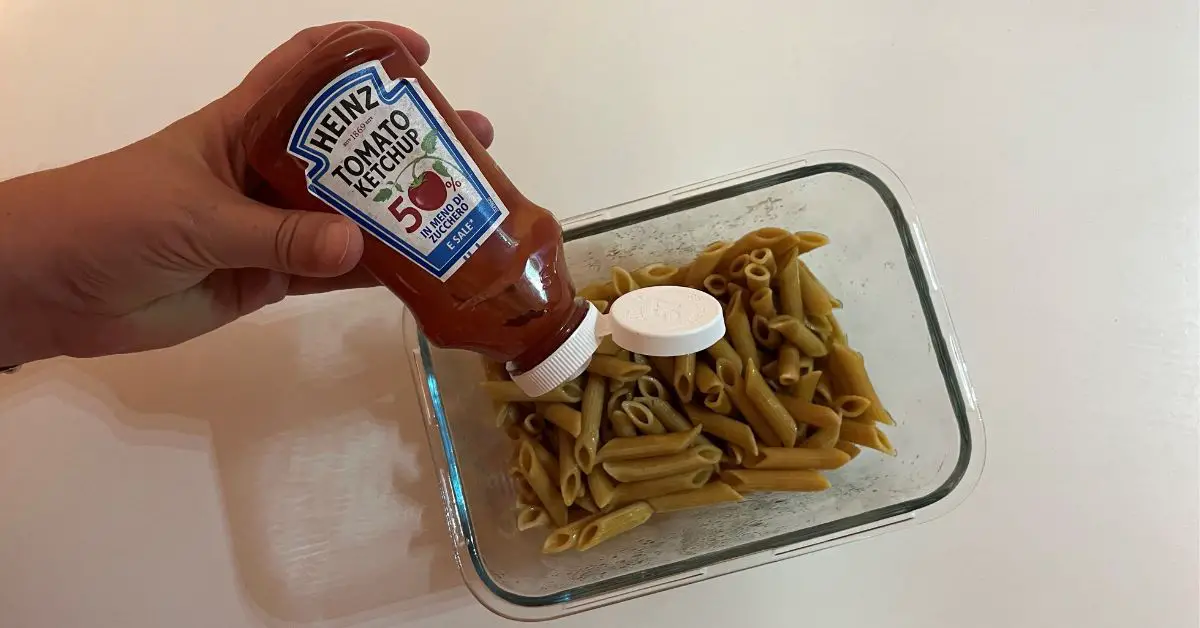The fact that Italians hate ketchup is one of the most ingrained beliefs among people living in America or abroad.
In Italy, ketchup is the second most purchased and consumed sauce after mayonnaise. 74% of those who buy it use it at least once a week, so it’s safe to say that we Italians have a fondness for ketchup. However, don’t assume we enjoy it on pizza or, even worse, on pasta.
The data from this Nielsen research speaks for itself:
- Italians in 2018 bought nearly 132 million pounds of ketchup.
- 74% of Italians who buy ketchup consume it at least once a week.
- Ketchup in Italy is the best-selling sauce after mayonnaise, in 2018 it generated a turnover of more than 44 million euros growing by almost 4 points per year.
Source: www.repubblica.it
I imagine the numbers above have provided enough information to answer those who ask, “Why do Italians hate ketchup?” Truth is, we don’t hate it at all, but there are certainly some foods we’d never dare to put it on… cough… pasta and pizza… cough.
Do Italians put Ketchup on Pasta?
From a survey conducted by YouGov, it’s evident that 89% of Italians surveyed deem it unacceptable to use ketchup as a condiment for pasta. As for the 7% who find it acceptable, I’m inclined to believe they might not be genuine Italians. Perhaps they’re single middle-aged men no longer living with their mothers…
Italian Opinions on Adding Ketchup to Pasta
| Response | Percentage |
|---|---|
| Unacceptable | 89% |
| Acceptable | 7% |
| Don’t Know/Undecided | 3% |
No, in Italy we never put ketchup on pasta, it is not an accepted condiment for a pasta plate, and it is seen as a mortal sin to season pasta with a splash of ketchup.
For this reason, no truly Italian restaurant will ever serve you a plate of spaghetti or a plate of penne sadly seasoned with ketchup. It’s also a bit rude to go to a classy restaurant and ask for ketchup. Here you can read about other good table manners to follow in Italy.
Since ketchup is a sweet and sour tomato sauce, it is a flavor traditionally not found in typical Italian pasta sauces. You can of course order, however, a great pasta dish topped with tomato sauce and basil. What you might know as ‘marinara sauce’, but which here we simply call tomato sauce.
It’s clear that the answer to the question: “is it illegal to put ketchup on pasta in Italy?” is no. It’s not illegal in the strictest sense of the word, but it’s highly discouraged…
If the only ‘red’ thing you have in the fridge is an old bottle of ketchup, just leave it there and consider seasoning your pasta ‘in bianco’. Read the link to understand what I mean.
Do Italians put Ketchup on Pizza?
Ketchup on pizza, just like ketchup on pasta, is also seen by many as heresy, far away from the Italian pizza tradition.
It is said that Italians hate ketchup on pizza, probably because we are quite jealous of pizza and traditional recipes, and seeing one of our typical dishes combined with the most famous American sauce in the world hurts us. (By the way, if you still haven’t understood why pepperoni pizza is hard to find in Italy, then read the link.)
But it should be noted that in this case there are some exceptions, in fact in recent years many non-traditional types of pizza have been eaten in Italy, especially among young people and children, one of them is a pizza with wieners, fries, and ketchup.
Seen by many as an American-style pizza just for tourists and children, it is still a pizza that some pizzerias might serve you.
On the other hand, some people like to eat their pizza crust dipped in ketchup, probably not everyone will admit it but it is something that especially at home is often done, here is the proof.
How do Italians really use Ketchup?
So Italians also love and eat ketchup, but don’t think that in consuming it we are as fancy as Americans.
In fact, ketchup in Italy is mainly consumed as an accompaniment for dipping chips or other snacks. It is also often mixed with mayonnaise to create a kind of pink dressing.
Another “traditional” use of ketchup in Italy is as a condiment for hamburgers and sandwiches, and yes even we Italians often eat the American-style hamburger topped with tomatoes, mayonnaise, and ketchup. Also in some panino to which we want to give an “American taste”.
But now let’s talk about the ways we Italians don’t use ketchup.
Do Italian Restaurants have Ketchup?
The answer to this question is not very simple, even though ketchup in Italy is widely consumed and is the second best-selling sauce after mayonnaise, it is still considered a fast food sauce, and not a sauce to go with local or gourmet dishes.
So in a typical Italian restaurant, you will not find ketchup on the table, and it is likely that even if you ask for it you will not be given it since they do not keep it in the kitchen.
Whereas in a fast food restaurant, a fry shop, or any trattoria that also serves fries, ketchup is likely to be there, although you won’t find it on the table but will have to request it from the waiter.
How is Ketchup called in Italy?
I want to reassure you right away, as the data you read above tells us, in Italy, we eat a lot of ketchup, and we call it exactly the same name by which it is known in America and around the world, ketchup!
So if you’re at a restaurant and you don’t know how to request ketchup, all you have to do is look the waiter in the eye and say, “ketchup please!“ and you’ll see it brought to you.
Is there an Italian ketchup brand?
If your interest is to find out if there is any Italian ketchup brand, the answer is yes!
Since the main ingredient of ketchup is tomato, and tomato is one of the most cultivated vegetables in Italy, we certainly could not pass up the opportunity to make ketchup “made in Italy“.
Here are some examples:
- Mutti ketchup: made only with Italian tomatoes, as much as 2.2 kg of fresh tomatoes to obtain 1kg of ketchup.
- Salsa Rubra Cirio: salsa rubra is the equivalent of Ketchup in Italy, this one is made with only Italian tomatoes.
- Biffi Ketchup: made in Italy and made 100% with Italian tomatoes.
- Ketchup Italy Bite: made with premium tomatoes, spices, brown sugar, and organic apple cider vinegar.
- Ketchupop: made mostly with San Marzano DOP tomatoes, grown and processed in Italy.
- Ketchup di datterino rosso: ketchup with the sweet and intense flavor of red date tomatoes, made from 100% Italian tomatoes.
The equivalent of Ketchup in Italy is Salsa Rubra?
You may have heard or tasted salsa rubra here in Italy and wondered if it is the same thing as ketchup, it is simply two similar sauces but evolved in parallel.
During the Fascist era, when Mussolini prevented the import of any product from abroad and enforced the change of all foreign terms to the Italian equivalent, ketchup was already quite famous in Italy.
So much so that, to prevent Italians from depriving themselves of it, a sauce was invented, “salsa rubra” (red sauce, from Latin), “Italian-style ketchup,” in essence.
From that moment then, despite their different origins, these two sauces became, for many, the same thing, and their use continued even after the war when ketchup finally returned to our tables.
Does Heinz Ketchup exist in Italy?
If you are not interested in tasting any of the ketchup made in Italy listed above, and you cannot do without your favorite ketchup during your trip to Italy, I can reassure you.
Yes, Heinz ketchup is sold in Italy. In fact, even here in Italy, Heinz sauces are among the best-selling and can often be found on supermarket shelves and in grocery stores.
Wrapping Up: The Italian Stance on Ketchup
As the data above suggest, we Italians love ketchup very much, second only to mayonnaise in consumption.
What, however, is not liked at all and viewed really badly, is using ketchup to season pasta; no Italian restaurant will ever serve such a thing.
On pizza, on the other hand, although there are no traditional pizzas with ketchup on them, it seems that some pizzerias offer their customers the option of ordering a pizza with wiener fries and ketchup.
That said, almost no restaurants in Italy put ketchup on the table, but some might still have it, especially if they also serve fries, in which case just ask the waiter “can I have some Ketchup please!“








Ciao Irene, thanks for the mention!